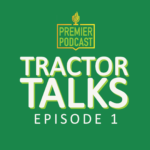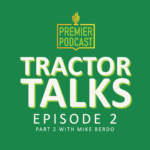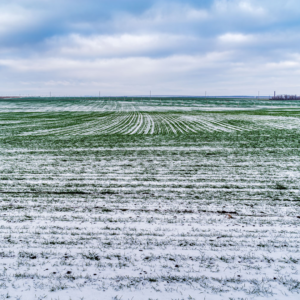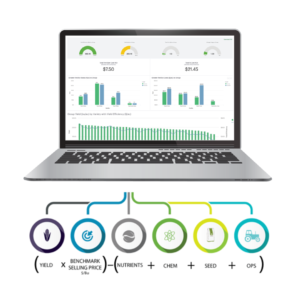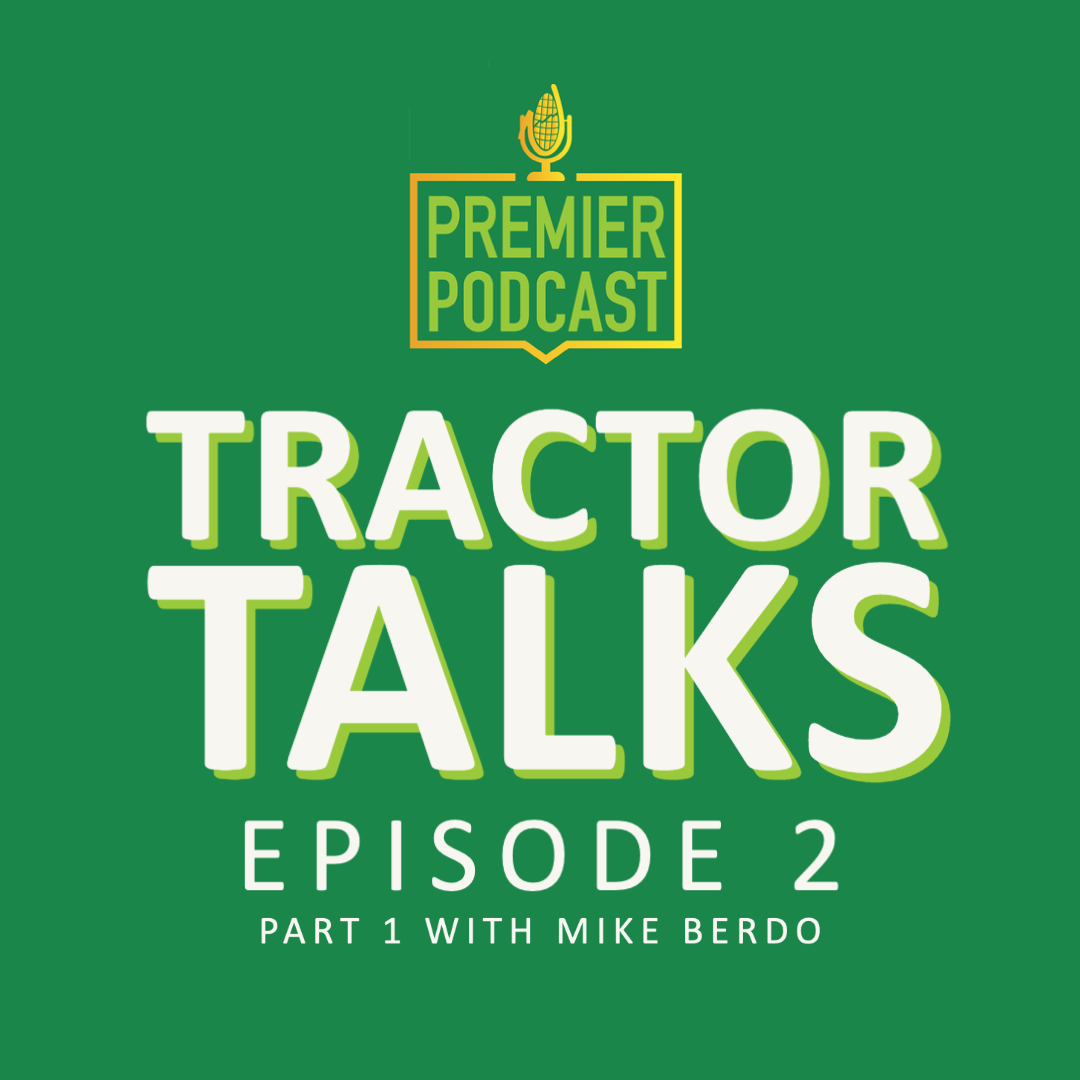
Tractor Talks is a mini series here on the Premier Podcast where we join growers in their tractor cabs during the spring and hear candid precision ag thoughts.
This series is hosted by Katie McWhirter, Manager of Training and Development at Premier Crop Systems.
If you are enjoying the show, tweet us at @PremierPodcast.
RENEE HANSEN: Welcome to the Premier Podcast miniseries ‘Tractor Talks.’ This is a series comprised of talks in the tractor cab with one of Premier Crop’s advisors, Katie McWhirter, and growers as they are in the field this spring. Listen to what their real, honest precision ag thoughts are when it comes to nitrogen management, technology and precision ag.
KATIE MCWHIRTER: All right, tell me your name.
MIKE: Mike.
KATIE MCWHIRTER: All right. So, Mike, how long have you been farming?
MIKE: So, I graduated high school in 1999 and went to Kirkwood in Cedar Rapids for two years, majoring in diesel mechanics. I came home in 2001, 20 years ago, about this time and came home to a wet spring. We planted like 10 acres in the month of April. And I came home, end of April, first part of May, and helped my brother put the whole crop in that year. I’ve been here ever since.
KATIE MCWHIRTER: Wow. So, why diesel mechanics?
MIKE: It was something new, something that intrigued me other than farming. Just something different.
KATIE MCWHIRTER: Interesting. So, 20 years of farming? Things have probably changed quite a bit.
MIKE: Totally.
KATIE MCWHIRTER: Okay, so what would you say are some of the biggest highlights of what’s changed since you’ve come home?
MIKE: The technology, I think, number one, with the auto-steer, data recording, data record-keeping and also the amount of management that is required to run a farm. I’ll stick by this comment till the day I die, but farming, anymore, is not hard work. It’s more management. That’s the hard work.
KATIE MCWHIRTER: I’ve heard that. I have heard that.
MIKE: The hardest work I do all week is load hogs. And that’s anywhere from three to four, maybe five, times a week. And that lasts an hour. The rest of it is choring, which is all mechanized, pretty much pushing buttons, running a skid loader, driving a tractor. But the days of baling hay, walking beans, manual labor? Those days are not gone by no means but rapidly disappearing, in my mind.
KATIE MCWHIRTER: So, they’ve made you more efficient?
MIKE: Totally. Yes, yes. Like I said, I’ll stick by that comment for a long time.
KATIE MCWHIRTER: And I laugh. Go back 20-30 years ago — I know how old we are.
MIKE: Yes.
KATIE MCWHIRTER: The whole ‘dumb farmer’ of the eighties, right? I mean, if you weren’t going to do anything in life, just go back and farm.
MIKE: Right.
KATIE MCWHIRTER: Don’t you think that is just completely the opposite anymore? You have to be business-oriented.
MIKE: Correct. Totally. When your dad, my dad, was farming — when they were our age and younger — it seemed like no matter what they did, they made money. I mean, if they had a few sows, a few cows, they made money. Yeah, corn is what? $6, whatever. Yeah, times are good right now, but how are you going to manage that to get the most profit potential per animal per head per acre bushel? That’s where the management comes in.
KATIE MCWHIRTER: I remember talking with a large livestock guy, and he said, when he was losing $3,000 a load on hogs, he goes: ‘We try, during those good times, how much can we bank up? Because when those valleys of despair come into play, we’ve got to be able to roll through it.’ Right? Because you’re going to have ups and downs. It’s interesting. So, obviously, the technology piece of it, I’m just curious as I look at your monitor, which is a Pro 700?
MIKE: Pro 700. Yep.
KATIE MCWHIRTER: Excellent. So, you are not driving the tractor.
MIKE: No.
KATIE MCWHIRTER: So, how has auto-steer and — I mean, we’re out, field cultivating?
MIKE: Soil finishing. Yep.
KATIE MCWHIRTER: Soil finishing. Thank you. All right. So, we’re soil finishing. How has auto-steer made you more efficient with doing soil finishing?
MIKE: So, this is, basically, our first year with auto-steer, fully.
KATIE MCWHIRTER: Really?
MIKE: Automation. We’re running off WAAS.
KATIE MCWHIRTER: So, why’d you do it?
MIKE: Just because all we had to do was buy the hardware. This tractor was wired for it. We had to buy the monitor, some hydraulic equipment to get this tractor on auto-steer. But right now, as we’re doing this, I can look back and make sure everything’s working, watch my gauges, do whatever. And this thing stays on course. We’re doing a simple operation right now. I can’t imagine. My brother’s planting a field clear across the town. He’s running the planter. He can make sure, watch his monitors, make sure the dry chain’s not popped off. Do whatever. I’m doing one thing. He’s doing multiple things at one time. We had auto-steer on the liquid shit tank last year, and that was huge.
KATIE MCWHIRTER: Why?
MIKE: I could make sure the plow’s not plugged up. It just relieves a lot of stress.
KATIE MCWHIRTER: Mike, as I’ve ridden with farmers this week, I would say — and at first I was questioning, like, are they acting this calm just because I’m in there? But it was like they really were relaxed, and it’s the end of April. I mean, normally it’s like April 11th? Oh my goodness. We’ve got to go.
MIKE: ‘Oh my God, the sky’s falling!’
KATIE MCWHIRTER: Right! And here we are, the 27th of April, and everybody’s just calm, and we’re going.
MIKE: Yeah, this week, a lot of units basically started this week.
KATIE MCWHIRTER: Right.
MIKE: But, in my opinion, there are a lot of people: ‘Oh, I don’t need that automation. Oh, God, that stuff costs money. Blah, blah, blah.’ Yeah, everything costs money, but we’re not overlapping.
KATIE MCWHIRTER: I was just going to ask.
MIKE: We’re being more efficient with our time, fuel, money. And auto-steer? Automations? This sort of stuff does have value. We only farm 1000 acres. I’ve got friends who farm tens of thousands of acres, and they’re RTK, RTX. And they’re right on the money. Yeah, we’re maybe going over six H’s or something, but it’s the real deal.
KATIE MCWHIRTER: Well, you said it best. I mean, you’re saving time and so much before. I don’t mean to laugh at our father’s generation, but I don’t think that they really took into account how much value their time had.
MIKE: No, not at all.
KATIE MCWHIRTER: And I think that’s a big thing.
MIKE: Time is a commodity.
KATIE MCWHIRTER: Oh, yeah. Yeah.
MIKE: How you use it is up to you, but wow.
KATIE MCWHIRTER: Well, and it’s funny if you go through the ISU custom map survey. Like, what would be the average, with labor? Right? If you had to pay for this to be done and pay somebody for their time? But farmers are like: ‘No, I own the equipment. It doesn’t cost me anything.’ And we’re like: ‘No, it’s fuel. It’s tractor. It’s wear and tear.’ It’s their time, and you’ve got a bunch of livestock. I mean, there are other things you could be doing at that time.
MIKE: Right. Right. I don’t know. My brother bought all the equipment for this automation, and I was like: ‘No. It’s your money. You can spend it on what. I don’t care.’ We don’t tell each other how to spend each other’s money. But it’s the real deal. I highly recommend it. I think anybody else would.
KATIE MCWHIRTER: So, your brother’s off planting. You guys have been doing precision for quite awhile. Soil sampling, that sort of thing. Okay. So, what do you feel has been the most beneficial for you? Has it been grid sampling? Is it this sort of thing? I know you went to Precision Planting a few years ago, and you were pretty excited about it. I mean, you went from…
MIKE: From nothing to we’re mapping our fields now. We’re not doing any prescription planting yet. But yeah, we went from the Kinze monitor to an iPad to the 20/20 so we can see our simulation population.
KATIE MCWHIRTER: And why is that important to you?
MIKE: Just, there again, I mean, nothing’s cheap. With our inputs, we need to know what we’re doing per acre. And some people are probably doing it knowing what they’re doing per seed.
KATIE MCWHIRTER: No, we laugh at that, but it’s probably coming, right?
MIKE: Oh, totally. Yeah. What’s next?
KATIE MCWHIRTER: Right. Oh, and that’s one of my questions. As I’ve ridden with farmers, like what is the next thing? What’s next? Okay, so let’s start with that. What’s next for your operation? What do you think? I mean, and maybe not this year. Maybe it’s two years down the road.
MIKE: We’re going to have to upgrade planters, whether new, used. It doesn’t matter. But to do multi-hybrid prescription planting on a farm like this? We’re south of town right now, Washington. This farm is probably one of our best farms. It’s flat black, and why wouldn’t we take advantage of that? We’re set up with the auto-steer. If that technology is there, it’s going to save seed. The neighbor who farms a lot of ground, a lot of rough ground, has a multi-hybrid planter. And he’s set. He’s doing a version of Premier’s record-keeping, grid sampling. The whole envelope. His rough ground out-produced some of his better ground by just doing the prescription planting with a multi-hybrid planter.
KATIE MCWHIRTER: And knowing how to do it. I mean, you can’t just go out and throw two hybrids in and pick some rates. There has got to be some data analysis. I give you and your brother props just because you knew you weren’t going to variable-rate seeding. Previously, when we worked together, we wanted to keep all this together because when we do make that switch, we want to be really confident in what we do.
MIKE: Yes.
KATIE MCWHIRTER: You don’t want to start with nothing in year one. You want a little bit of confidence.
MIKE: And with Chase Gingrich and yourself, we have that confidence to make that next step. And with the support of technologically savvy people, we have that luxury of making those steps with those people on our teams.
KATIE MCWHIRTER: And isn’t it funny? I mean, you talked about the rougher ground out-producing or maybe being more profitable than the better. This makes me think back to group data and some of the analytics that we did. I remember a set of two brothers that was like: ‘So, what you mean is I should go to the auction and buy the CSR ground that’s like sixties.’ I was like: ‘No, no, no. I’m not telling you to go buy that.’ But it’s about management.
MIKE: Yeah!
KATIE MCWHIRTER: And, really, there are things you can change and fix but those that you can’t manage differently so that you’re not treating every field the same in order to be more profitable.
MIKE: Isn’t that what Premier’s doing right now?
KATIE MCWHIRTER: Well, that’s true. I know that!
MIKE: I know. I know!
KATIE MCWHIRTER: But you know me. I mean, I’m passionate about it because…
MIKE: Right!
KATIE MCWHIRTER: I laugh. I’ve been to Oklahoma and Kansas. And, I mean, there are guys being more profitable with 80 bushel corn on dry land than somebody who’s producing 150 bushel here in Iowa. And I’ll guarantee you their land rent…
MIKE: Yeah, everything’s relative.
KATIE MCWHIRTER: Right!
MIKE: And they’re not — down in Oklahoma, what are they dropping for population?
KATIE MCWHIRTER: 14 to 17. I mean, depending.
MIKE: Half as much as we are.
KATIE MCWHIRTER: Right! So, it is. It’s about management. So, for you guys, it’s going to be that. What else do you think is on the horizon?
MIKE: That’ll be our next big step. What do I think the next big step will be? There will be — I don’t know when. I’m a conspiracy theorist, but there will be some sort of a ‘microchip’ in these seeds to give us — if somebody was out there in the middle of the night, cutting cookies in the field — to give us moisture, weather conditions. I don’t know.
KATIE MCWHIRTER: And not only that. From traceability, sustainability, this stuff is not going away, as far as having to prove that food is safe and that sort of thing.
MIKE: Yes. It’s, like, cool with livestock. Harvested in the USA.
KATIE MCWHIRTER: Right. Right.
MIKE: I don’t know.
KATIE MCWHIRTER: Isn’t it funny? Because we could have — back when we were kids, I watched ‘The Jetsons.’ I don’t know if you did.
MIKE: Oh, yeah!
KATIE MCWHIRTER: Okay. So, you think about it, like: ‘Rosie, clean.’
MIKE: ‘Hey, George!’
KATIE MCWHIRTER: ‘Rosie, clean.’ And I’m like: ‘I have a Roomba.’ I have a robotic vacuum. And they used to call up on the screen, and we were like: ‘Oh my goodness. They’re making phone calls while looking at people.’
MIKE: FaceTime.
KATIE MCWHIRTER: Right. FaceTime. And, my goodness, COVID brought us Zoom. And everybody’s so Zoomed out. We thought it was so cool on ‘The Jetsons.’
MIKE: Right! And here we are.
KATIE MCWHIRTER: But it’s reality, right? I mean, cars drive themselves, and tractors drive themselves. So, that’s interesting. We talked a little bit yesterday. You said you changed up some of your practices. So, you’re going to come back on some corn on corn and do some side-dress that you haven’t done before.
MIKE: Correct.
KATIE MCWHIRTER: So, you’re using the data that you and Chase have been collecting and analyzing.
MIKE: Yes, yes.
KATIE MCWHIRTER: That’s awesome because, to me, data’s data. But if you don’t do anything with it…
MIKE: It’s useless.
KATIE MCWHIRTER: It’s useless!
MIKE: Right. What are we doing this for? Why are we paying Premier per acre if we’re not going to…
KATIE MCWHIRTER: Right!
MIKE: Okay. Chase, Katie. Yeah, we better be doing this. Okay. Let’s give it a whirl.
KATIE MCWHIRTER: Right. So, that’s exciting. Are you excited? Nervous? Both?
MIKE: I don’t know.
KATIE MCWHIRTER: Because you primarily have a lot of hog manure.
MIKE: Yes, yes.
KATIE MCWHIRTER: And that’s where a lot of people are like: ‘Oh, but I got hog manure. I got manure.’
MIKE: There have been mixed thoughts. I don’t know. Some people are: ‘Oh, yeah. It’s there.’ No, you’re good to go for the year. And other people are: ‘Oh God, you jackwagon. You better be putting something else on.’ Which we put — I don’t know — 40 to 50 units, all with the planter, of liquid off the back. And we’ve done that for almost 10 years and — I don’t know. I think some of this hog manure does get away on some of these hills.
KATIE MCWHIRTER: Or is it available? Yeah.
MIKE: Is it available? Did it get away? We used to put Instinct on. That was kind of a pain in the butt with the equipment in the fall. Sometimes it wouldn’t work. Sometimes it would. So, how much did it get on? Nobody knows. So, we went away from that last year, and we got a toolbar from a neighbor who wasn’t using it anymore. He said: ‘Use it. Tell me what you think. Whatever.’ Okay. So, we’re not going to do it on all our corn-on-corn acres, I don’t think, but we’re going to give it a try.
KATIE MCWHIRTER: And I think — which is awesome to split up nitrogen like that. I think, as we read more and — again, I’m not going to get into politics or anything of that. I mean, regulations have been on the horizon for years, right?
MIKE: Oh, yeah!
KATIE MCWHIRTER: And, eventually, right? Everything that happens on the coast moves its way in. So, I mean, for you, I would think that you’d feel a little better, if/when regulations happen, that you’ve got a better handle on…
MIKE: Right. We’ve been doing this for X years.
KATIE MCWHIRTER: Right. So, all of a sudden, if you’re told an amount, it’s like: ‘Okay, we’ve fine-tuned. We’ve done a lot of data analysis on our own fields.’ Not in Crawfordsville. Not in Wyman or wherever the research farms are.
MIKE: Right. On an ISU research farm.
KATIE MCWHIRTER: Right?
MIKE: No, we’ve been doing it here, on our operation. Oh, you want records? Oh, here you go. But we did, in turn, give up spraying on our own. We’re going to have that all hired out this year just because we probably can’t do everything.
KATIE MCWHIRTER: But, again, part of your team, right? I mean, it’s a trade off.
MIKE: Yeah, totally. Totally.
RENEE HANSEN: Thank you for listening to the Premier Podcast and our series of ‘Tractor Talks.’ This conversation with Mike and Katie was so great that it extended, and we’d like you to stay tuned for part two, coming soon.
___________________________________________________________________________________________
- For more helpful tips and insight on all things data and agriculture, visit our blog at http://info.premiercrop.com/blog
- Curious about precision ag? Download our 5 Steps to Getting Started Guide: http://info.premiercrop.com/5-steps-guide
- Ready to cut through the bull? Download our No Bull Guide to Precision Ag: http://info.premiercrop.com/field-profitability-guide
- Podcast provided by Premier Crop Systems. Learn more about us at https://www.premiercrop.com

